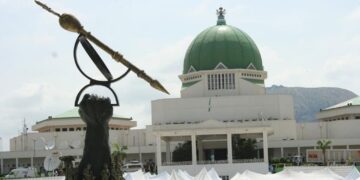[ad_1]
The current face-off between the Central Bank of Nigeria (CBN) and the Federal Ministry of Finance has received a lot of reactions from economic and finance expert.
The CBN last week Wednesday announced that it will replace the ₦100, ₦200, ₦500, and ₦1,000 banknotes with new designs, effective December 15, 2022 – barely seven weeks before the current banknotes of these denominations become irrelevant.
A herd of experts have so far supported the Central Bank of Nigeria (CBN) as it insists that it followed the law and proper procedure to carry out the exercise, which has been overdue for 12 years.
This was in response to claims made by the Minister of Finance, Budget, and National Planning, Zainab Ahmad, that her ministry was not consulted by the CBN in the ongoing process of redesigning three series of the Naira.
The minister, who was responding to posers raised by Senator Opeyemi Bamidele (APC Ekiti Central) during the 2023 budget defence session at the Senate Committee on Finance, warned that the new notes could have dire consequences on the value of the Naira.
Bamidele had told the Finance Minister that barely two days after the announcement of the policy by the CBN, it had started having repercussions on the value of the Naira when compared to the US Dollar.
She said, “Distinguished Senators, we were not consulted at the Ministry of Finance by CBN on the planned Naira redesigning and cannot comment on it as regards merits or otherwise.“However, a Nigerian privileged to be at the top of Nigeria’s fiscal management, the policy as rolled out at this time, portends serious consequences for the value of Naira to other foreign currencies.“I will however appeal to this committee to invite the CBN governor for required explanations as regards merits of the planned policy and rightness or otherwise of its implementation now.”
A former CBN deputy governor Dr. Kingsley Moghalu says the Finance Minister Zainab Ahmed’s comment to the National Assembly that she was not aware of the Naira redesign by should not mislead anyone into thinking the CBN owes her that kind of information.
According to him, the Bank only needs the approval of President Mohammadu Buhari for this particular exercise and it received that approval.
He explained that there are only three issues on which, in the CBN Act of 2007, the Bank should obtain external authorization, and only from the President of Nigeria, for its operations: Any alterations to the legal tender (the Naira); any investment of the Bank’s funds outside Nigeria; and the Bank’s annual report.
Outside of these, the only approving authorities for CBN operations are its Committee of Governors (note the “s”) consisting of the Governor and the four Deputy Governors, and the Board of Directors of the CBN, which includes the Governor, the four Deputy Governors, and 7 external members which include the Permanent Secretary of the Federal Ministry of Finance and the Accountant-General of the Federation Moghalu clarified in ama post on his twitter handle @MoghaluKingsley.
“My criticism of the current Governor of the Bank in the past is that he has politicized the central bank by routinely subjecting its operations to the whims and caprices of the Presidency far beyond what is the appropriate relationship, and compromised the independence of the CBN as a result.
“That is why the Finance Minister erroneously feels entitled to be informed or consulted. The CBN should now focus hard on the implementation of this policy, which Moghalu says will impose huge pressures on the banking system.
Similarly, a public policy analyst Mr. Emmanuel Odunsi on his part said the roles of the CBN and Ministry of Finance are different, adding that the CBN is not a parastatal under the Ministry of Finance and the CBN Governor does not need to consult the Minister of Finance on monetary policy.
According to him, the National Assembly supervises the CBN. And the Finance Minister’s comments were a reply to the National Assembly questions.
To Oluseun Onigbinde, a Nigerian entrepreneur and the CEO of budgIT, but Permanent Secretary of Ministry of Finance is meant to be on CBN board. “So how’s she not aware of such huge decision?” he asks.
The CBN’s spokesman, Mr. Osita Nwanisobi, expressed surprise at the minister’s assertion in a Friday night interview with a group of journalists in Abuja.
He emphasized that the CBN is still a very meticulous organization that adheres to due process when making policy decisions.
Nwanisobi claims that in accordance with section 2(b), section 18(a), and section 19(a)(b) of the CBN Act 2007, the Management of the CBN properly requested and received President Muhammadu Buhari’s written consent to redesign, produce, release, and circulate new series of N200, N500, and N1,000 banknotes.
He added that the integrity of the currency, the CBN, and the nation were all at risk due to a number of escalating challenges facing currency management in the nation.
According to Nwanisi obi, every top-notch Central Bank was dedicated to preserving the credibility of the country’s legal tender, the effectiveness of its supply, and its ability to carry out monetary policy.
The CBN spokesman expressed optimism that the effort will, among other goals, deepen Nigeria’s push to entrench a cashless economy in the face of increased minting of the eNaira while assuring Nigerians that the currency redesign exercise was strictly a central banking exercise and not targeted at any group.
Cost of Printing
Top officials of the CBN said the printing will come at no outrageous cost because they will be printed in the country and within the budget of the apex bank.
They further stated that 85 per cent of the currency in circulation is being held by the 10 per cent of the population who are unable to account for those funds, and that this would help reduce money in circulation.
The Director of Monetary Policy, CBN, Hassan Mahmud and the Director, Currency Operations, CBN, Ahmad Bello Umar, both reiterated these on Friday when they appeared on the ‘Morning Show’ on Arise News.
Mahmud said: “I think we should look at it from the perspective of what we intend to achieve before you start thinking of the cost. I don’t want to go to the extreme that CBN is supposed to be a profit-making organization, but it is supposed to achieve certain gains. You must tally those gains in terms of macroeconomic stability or price stability, which are its primary mandate.”
He said the new notes would be produced locally by the Nigerian Security Printing and Minting Company (NSPMC) in Abuja and Lagos.
On his part Umar said: “The point being emphasised here is that the cost is not largely going to be such volume that will negate or net out the benefits that we want to achieve. What is important is how the CBN is able to achieve its primarily mandate, which includes other mandates of ensuring an efficient and durable currency, coupled with the facts that it is a legal tender and also used for payment settlement within the economy.
“But again, the emphasis has been that this cost is not even something that is out of CBN’s budget; it is not extra huge sums that will attract a big hole in the cost of minting the currency.”
On the fall of the Naira in the parallel market after the redesigning announcement, Umar said: “Let me start with the movement in the BDC exchange rates segment of the market. Basically, you can say people are panicking trying to exchange the excess Naira they have for the dollar. But then, we have to remember that the BDC segment of the market is just less than five percent of the entire FX market.
“I imagine as we progress with the banks receiving old Naira, the BDCs themselves will be in quagmire; they will not be able to explain their sources of getting so much money.
Initial panic will raise dollar exchange rate
In a quick reaction, a renowned Economist and the Chief Executive Officer (CEO), Financial Derivatives Company (FDC) Mr. Bismarck Rewane in an emailed note to Sunday Tribune on what will be the impact of Naira redesigned on the value of the Naira in the forex market, explained that theoretically, it should have no effect whatsoever. But forex markets are usually a subject of panic and speculation, so he added, the first reaction to the new regulation is likely to be a flight to safety by investors.
This entails people buying dollars hoping that the value will increase in future, so that they can resell.
For example, anytime there is a major global market shakeout, investors scramble for gold and dump the U.S. dollar.
“So we expect some initial speculation against the Naira but this should be short-lived. The Naira traded at N770/$ on Wednesday but should settle at its true market value in the days ahead.
The CBN had clarified that it will no longer print large quantities of bank notes, and that no bank customer shall bear any charges for cash returned/paid into their accounts.
CBN also said it will in conjunction with the EFCC be tracking all deposits and banks must only accept cash from customers with full personal details (KYC) and bank accounts, as cash must only be paid into existing accounts not ledgers or suspense accounts.
Similarly, analysts at Proshare believe that the decision of the CBN would help prevent vote-buying during the 2023 general elections since politicians who have stashed large volumes of cash would be forced to convert the same to new notes.
“If banks play their role of reporting transactions of certain volumes to the Economic and Financial Crimes Commission (EFCC), the withdrawal and transfer limits would act as an effective control valve on the amount of money available for vote buying,” the Analysts stated.
According to Proshare’s e-mailed intelligence analysis, the ultra-rich, who hold large amounts of existing currency, may consider the dollar and other liquid securities as alternatives to lodging their monies in the bank, thus sending asset prices higher in the short term.
Effects on Businesses, households and others
A Lagos-based investment banking and research firm Afrinvest (West) Africa Limited highlighted likely gains and trade-offs of the currency redesign on Households, Businesses, Deposit Money Banks (DMBs), CBN, and the Federal Government (FG) given the current domestic and external economic conditions.
In an explanatory note made available to Sunday Tribune, Afrinvest stated that the exercise will be a mix of fortune for the households.
“A surge in attempts to convert the Naira to foreign currencies (e.g., USD) could exert further pressure on the exchange rate in the near term.
“Professionals in asset-preserving jobs, such as building construction and precious metals may witness increased demand while real estate pricing may negatively be impacted post-2022 should housing assets increase astronomically in the near term,” it stated.
For businesses, the firm’s team of experts concluded that likely surge in demand by the “unbanked and unwilling to bank populace” could help lower inventory and receivables of durable product producers.
Also, untimely rejection of the current legal tender by businesses especially in communities without banking presence would inflict avoidable economic hardship on the citizens and business profitability.
For CBN itself, Afrinvest noted that monetary policy vulnerability to pre-election spending could ease up and that it is an opportunity for the CBN to push for improved adoption of the e-Naira.
On the other hand, the cost of printing the new notes would impact negatively the CBN’s balance sheetin the interim.
ALSO READ FROM NIGERIAN TRIBUNE
It observed that currency in circulation (about ₦3.4tn) is less than 10.0percent of the aggregate money supply (M3) as of end of September 2022.
Hence, monetary policy efficacy would remain weak unless complemented by cutbacks on fiscal deficit financing and excessive interventions.
According to Afrinvest, liabilities from counterfeit and unfit notes would subside.”Attraction of more bankable population to the formal banking channels would increase low-cost
Current Account and Savings Account (CASA) mobilisation and potential to sweat out assets.
“Banks operating margins would take a beating given CBN’s silence on compensatory measures for the directed Saturdays’ operations and zero charges on deposits till the end of the transition period,” the firm’s note highlighted. On the part of the federal government more tax-liable individuals and businesses would be identified and war on terror financing and kidnapping would receive a boost.
It further explained that disruptive effect of the currency reissuing process could weigh on Gross Domestic Product (GDP) performance and non-oil revenue targets for Q4:2022 and Q1:2023.
Like other Apex Banks across the world, Afrinvest stated that the CBN is constitutionally empowered to take measures that would ensure the preservation of the integrity of the fiat note, as part of currency management functions.
By convention, the global best practice for Central Banks is to redesign, produce, and circulate new banknotes every 5 to 8 years.
For the CBN, the last of such actions was in 2007 when the ₦50 and other lower notes were redesigned and reissued.
“In our view, though the timing of the CBN’s action could be considered a masterstroke in easing some of the contemporary social (e.g. vote buying and ransom payment) and monetary policy challenges (e.g. weak transmission mechanism) be devilling the economy, other fundamental factors need to be addressed concurrently to get the desired results.
For instance, the CBN noted that over 85.0percent of currency in circulation (CIC) was outside of banks’ vaults in September 2022. “While this submission is undeniable, our analysis of CBN’s data on CIC and currency outside of banks’ vaults since 1960 points to a similar trend.
“We opine that this could be linked to the high financial exclusion rate (2020: 55.0%, EFInA), large informal sector activities (2018: 60.0%, IMF), lack of banking presence in many remote communities, and the weak confidence in the efficiency of the formal financial system, especially by informal sector players.
“These dynamics we believe partly contributed to the failure of the recent Monetary Policy Rate (MPR) hikes from stemming inflation as anticipated by the CBN.
“Furthermore, we are of the view that the problem of a worsening shortage of clean and fit banknotes would persist if the CBN and relevant law enforcement agents do not up their games.
“For instance, public sensitisation on the proper handling of banknotes tops CBN currency management roles as stipulated in the CBN Act 2007. This effort (in our view) has been very weak, especially in large informal communities and rural settings where cash handling is prevalent,” the firm stated.
[ad_2]







